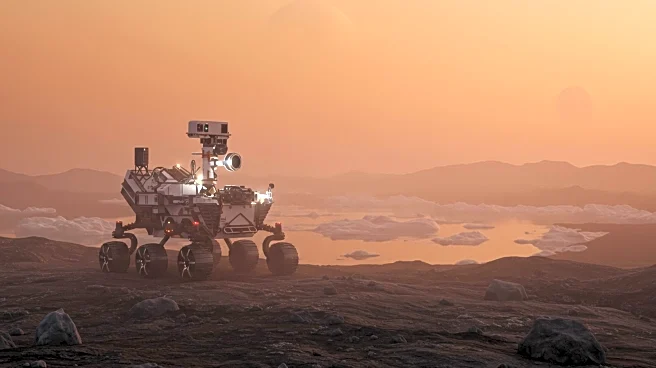What's Happening?
NASA researchers have proposed that vesicles, which are cell-like structures, could naturally form in the hydrocarbon lakes of Saturn's moon Titan. This discovery suggests a new pathway for the emergence of life's precursors in environments beyond Earth. Titan is unique in the solar system for having stable liquid on its surface, composed of hydrocarbons like ethane and methane, rather than water. The study, published in the International Journal of Astrobiology, explores how amphiphiles, molecules that can spontaneously arrange into vesicles, might form in Titan's lakes. These vesicles could potentially lead to the creation of protocells, which are considered essential for the development of living cells. The research builds on data from NASA's Cassini spacecraft, which revealed Titan's dynamic weather system and complex organic chemistry.
Why It's Important?
The identification of potential building blocks of life on Titan expands the possibilities for where life might originate in the solar system. This research could significantly impact astrobiology by providing insights into how life could form in environments vastly different from Earth. Understanding the conditions that allow for the formation of protocells on Titan could inform theories about the origins of life on Earth and other celestial bodies. The findings may also influence future missions to Titan, as scientists seek to explore its surface and atmosphere for signs of habitability. The upcoming Dragonfly mission, although not targeting Titan's lakes, will further investigate the moon's surface composition and environmental conditions.
What's Next?
NASA's Dragonfly rotorcraft mission is set to explore Titan's surface, providing further data on its composition and habitability. While the mission will not directly study the lakes, it will gather atmospheric and geophysical measurements that could enhance understanding of Titan's environment. Researchers may continue to develop models and experiments to simulate the formation of vesicles in Titan-like conditions, potentially leading to new discoveries about life's origins. The study's findings could also prompt additional missions focused on Titan's lakes and seas, aiming to detect vesicles and other signs of prebiotic chemistry.
Beyond the Headlines
The discovery of vesicles on Titan could have profound implications for the search for extraterrestrial life. It challenges the notion that water is the only medium in which life can develop, suggesting that life could exist in forms unfamiliar to us. This research may also influence ethical considerations in space exploration, as scientists ponder the implications of discovering life beyond Earth. The study highlights the importance of interdisciplinary approaches in astrobiology, combining chemistry, physics, and planetary science to explore life's potential in diverse environments.









